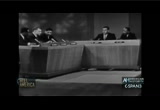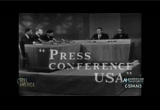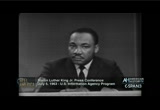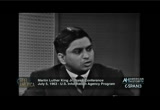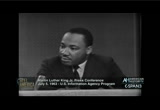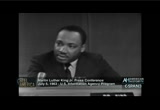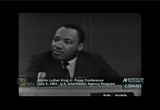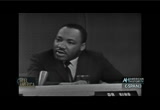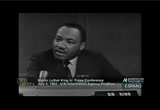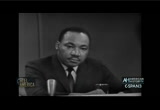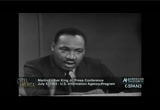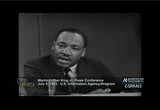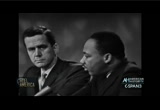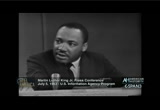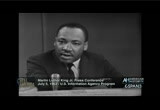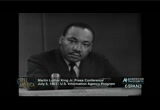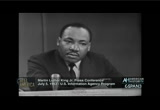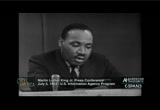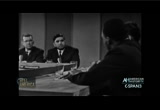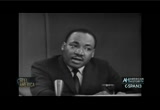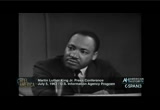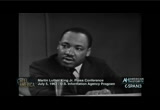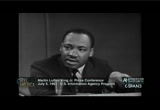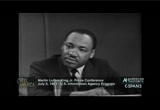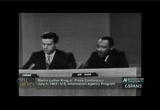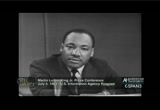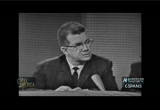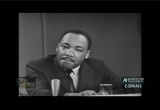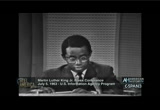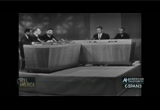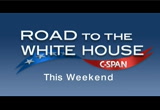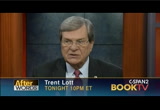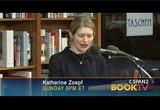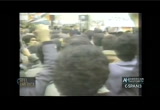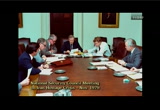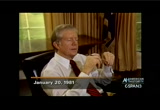tv Martin Luther King Press Conference CSPAN January 23, 2016 8:00am-8:37am EST
8:00 am
>> bea beach we can reel america brings july 5, 1963 om reverend martin luther king jr. interviewed by journalists. of the u.s. ode information agency program press which fathereda. journalists questioning a well-known public figure. to explain his n nonviolent approach and comment president kennedy's civil rights bill and sky how he's mahatma begand by did i. hey were distributed internationally but couldn't be
8:01 am
shown in the united states until years after the original release. this is about 30 minutes. >> press conference u.s.a. a which wellprogram in known correspondents question a news.g personality in the our guest is the reverend martin luther king. to introduce our guest and the anel of correspondents here is robert lodge the moderator of press conference u.s.a. >> welcome to press conference u.s.a. ur guest the reverend dr. martin luther king game spokesman and leader of negroes southern united states at the unusually early age of 27. bus boycott in ontgomery that resulted in integrated buses negroes and
8:02 am
whites riding side by side. the southern of krpb leadership conference he turned his attention to of restaurants and other public facilities. he's played a leading role in negroes registered to vote an important step in achieving equal rights. now at age of 34 dr. king a aptist minister married and father of four children has become a symbol of the struggle segregation here in the united states. panelerview him we have a of distinguished correspondents an african, asian and southern man who wrote the book the case for the south. entlemen, would you identify yourselves. united is george the nations correspondent for the agency. >> this is william workman of columbia, south carolina, of the state or
8:03 am
tphaourps r newspaper. washington correspondent. our questioning with mr. parasaran. >> dr. king, this year 1963 is i a decisive g to be year in the struggle of the egro race for equality in this country. i wa i wonder if you could tell us your immediate goals are going to be? dr. king: so far this year we cities in the southern part of the united public esegregate facilities as a result of the demonstrations that have taken place, the various sit-in so forth.and think that this will continue
8:04 am
it seems to me now probably more before we stand on the hreshold of a very significant in civil rights in the united states and we have a meaningful t strong civil rights legislation. if this legislation is enacted , we will go a making theway toward american dream a reality. i do not think civil rights will solve all the problems that we now face and it certainly not bring about integration in all of its dimensions. but i think it will solve many problems and bring about many of we seek in this struggle. >> dr. king, will you spell out conception of civil rights
8:05 am
which to me means rights prescribed by statute or and not those that go to the social conduct or ommerce of the ordinary marketplace? dr. king: well, i would think of as those basic rights that are guaranteed by on the basis of he first and the 14th amendments. i think there is a distinction social privilege on the one hand and civil rights on the other. thing to say who will a in my living room as friend and as a guest. it is another thing to say who beside me on the bus or in a public place. i think at that point a is a violation of civil rights. i think in the first instance i choice to democrat who ill be a guest in my house and i think all public facilities
8:06 am
all citizens to ithout regards to race, nationality or religion. >> by public facilities i take privately owned facilities and make those public. king: yes, i would include privately owned facilities that publicly sustained and dependent on the very public for survival. i'm not speaking of one's home speaking of any business that is in the public arket and that is dependent on the public for its survival and lso that is licensed by the state for its very operation and existence. deny to the ould proprietor the right to select that portion of the public to to cater?nts dr. king: yes, if it is on the of race.
8:07 am
i think he ought to have the right to keep drunk people out who are not in disposition as far as their manners are concerned. but i do not think any should have -- right deny access to the facilities of his particular business because of race. businessman should have rights, but he must also not only a iness is right, it is a privilege and responsibility. such admission he were patronage and te go out of business, that would be acceptable in your view? king: i don't think our nation can rise to its full come ty until businesses to see that no one individual should be denied service because of race. i do not think this will lead to on the part of
8:08 am
white customers. demonstrated over and over again in the struggle for civil rights. cities, in fact more than 75 cities in the south have integrated their lunch counters since 1960 cilities and on the whole these increased in e terms of their income rather decreased. i think that this will continue to be true. i do not think that one hould deny service to members of another race because there is recalcitrant individuals threaten to withdraw their ervices if the place is integrated. >> president kennedy's proposed before thes bill now
8:09 am
congress has been described in far-reachi ers as far-reaching. people ther hand, other it as very ribe sadistic.nd could you care to comment on the president's proposed legislation before congress? king: i would say that this very strong far-reaching bill. certainly it is the strongest bill that has ever been president of ny our nation. this does not mean that it has it that i would like to see. i had hoped that a federal fair employment practice would have been submitted
8:10 am
ith the president's bill and some other things such as giving the attorney general the right initiate suits in any area where there is a denial of civil rights rights, where this bill only calls for the attorney general right to initiate suits in the area of school desegregation. but with these points missing i think it is by and large it is a forthright bill. now i would have to disagree ith the honorable senator of he state of georgia which laps -- happens to be my home state inhuman ays it is a bill or sinister bill. i think on the contrary it is in principleshe deepest of our american democracy. ink it really carries insightsll of the deep of the democratic ideal as well
8:11 am
dream.american one fof the basic things in our is the declaration of independence which speaks of the created all men are equal and endowed by their life, liberty and pursuit of happiness. i don't think these things can meaningful and real until all our country ns of are guaranteed their basic civil and i stitutional rights think this bill is in line with independence n of and constitution and i think it backcarry our whole nation to those great insights and reat principles if it is enacted and implemented. senator russell has
8:12 am
said and others have said the partners of the past cannot be overnight, that whites cannot change their attitudes, for instance, so fast as negroes would like them to change them. how do you answer that statement? king: i think we are dealing matters here. on the other ha we are dealing with the problem of grappling behavior and controlling behavior. on the other hand we are dealing with changing attitudes. agree that attitudes are not often changed overnight. be truehis sense it may that you cannot legislate morals. while it is true that orality cannot be legislated, we must see the other side and that is that behavior could be regulated. not change the heart
8:13 am
but it can restrain the heartless. an immoral it is ure to hold the position that individuals, whether they of other or members minority groups, should have hat basic constitutional and god given rights held up until individuals are able to change their attitudes. the nk by change being system -- by changing the system itself we are often able to make it easier for individuals to change their attitudes. bringing k by desegregation into being it will are slow people who to change their attitudes move to the point of changing their easier than they would otherwise. about 1/10constitute of the united states population. achieve ink they can
8:14 am
equal rights without the good will or agreement of the white in other words, don't you see your task primarily that one of persuasion? r. king: yes, i think this is basic but i wouldn't say it is only persuasion. persuasion and legislation and all that goes with that. both persuasion and moral coercion. is quite true if we had an integrated society it ust come by containing of the heart appear -- change of the heart and persuasion. you e other hand i think can legislate desegregation. if not that the habits, the hearts, of men have been and day by g changed every judicial decrees, executive orders from the president and by acts.ative so that you cannot legislate ntegration but you can certainly legislate
8:15 am
desegregation and there is a difference between the two. > dr. king, in your reply to of aprilr of 8 alabama will, i think, criticized the attitude of the put it.derates as you of today f the judge id not recapture the sacrificial state of the church of ill forfeit the loyalty be dismissed as irrelevant and no meaning for the 20th century. in the u expand on this light of the role played by the as a moral and persuasive
8:16 am
authority in the negro movement toward equality? king: i think i would have he past tly admit in t the church has not stood up in up.s area as it should stand i think at this point the church failed christ miserably. t has so often been the taillight instead of the headlight and we must face the 11:00 on sunday morning when thousands of united ns all over the states stand to singing christ there is no east or west, we in the most segregated hour of america. appalling, yet we must face it as a fact of our nation. on the other hand, i think i ust say that some very
8:17 am
encouraging things have developed within the last few weeks weeks. i mean encouraging developments church.he church groups are now taking the kind of forthright stand that i have longed to see as a minister , the national churches came out just three weeks ago with a very calling not ent segregation nd to as a pronouncement but calling denominations nd ministers to participate in demonstrations and direct action .rograms to end segregation the same thing has developed roman catholic church and very strong pronouncements the various m
8:18 am
councils.l many rabbis have come out. in see a new development the church which is a very significant development and, to new beacon light of hope. think the church now is maneuver i moving on in the way it should and making its witness clear. in the patternat f movement with mr. ghandi it india and what is the struggle american negro in the wor orldwide movement of freedom with people settling down in the united states? dr. king: to answer the last part of the question first, i would say that our movement here in the united states is in a part of the
8:19 am
worldwide struggle to break down of injustice and depression. or s not an isolated detached struggle, but it is a worldwide struggle for freedom and human dignity. part of the question, i would say that our movement has been patterned ghandiian movement in deal. a great you have been influenced by mahatma ghandi a great deal, and this is true of many, many people in the movement in the united states. some years ago when i first studied the ghandiian philosophy and method of nonviolent resistance, i came to the that it was the most potent weapon available to people in their struggle for freedom and human dignity. say that this
8:20 am
overall direct action movement sit-ins and stand-ins, -ins, mass neel marches and pilgrimages and all enter er elements that the struggle have been patterned ghandi.deal after certainly some sociological in the ces in that united states we are a numerical facing the opposition who form a viduals numerical majority where it the other way around. the other thing is we are struggling for integration where there was a struggle for independence, and there is a difference. wuone instance you are seeking o gain freedom from a foreign invader and the other you are seeking to come to a new kind of t and
8:21 am
integrated brotherly living with same ry people who in the situation are oppressing you. when you ow that up, anti whiwhite an movement but trying to fulfill he american dream of independence. in other words the united states would be a better place to live in not only for the negro but for the white people. definitely.ery i conceive of this struggle not millionuggle to free 20 negroes in the united states, 180 struggle to free million citizens of this country. nd i don't think anybody in this country can be truly free free. the negro is and i certainly don't think the white man is free as long as you and segregation discrimination. because the festering sore of debilitates the
8:22 am
white man as well as the negro. i say that our to in this struggle is not defeat or humiliate the white but to win his friendship and understanding and the end is econciliation and creation of the beloved community. we are not seeking to annihilate the opponent but to convert him. this is why we follow nonviolence. i think that the end of violence to get rid of, to annihilate the opponent. in the nonviolent movement the end is to convert the a onent and bring about society where all men will live ogether as brothers and every man will respect the dignity and worth of human. >> do i understand you would have brotherhood by federal are to those people who not willing to engage in what you consider to be brother rood? king: no, i don't mean you
8:23 am
would have brotherhood by federal force. don't think you can really federale brotherhood by force. do think though that you can break down the legal and and man-made barriers -- make brother rood brotherhood impossible by federal force. don't think you can have brotherhood as long as there's a system of racial segregation. now, i do feel that this system an be broken down by federal for force. hen you move to the realm of true brotherhood and true ntegration which is general interpersonal link and mutual we move into another realm. i don't think that can be done force but the
8:24 am
barriers can be broken down and bring us nearer to the goal. the president's program were incorporated or such portions that with lend would you to this how will about submitting this to a vote of the people of the united states who have really never had an opportunity to express themselves in this area? certainly his would be all right with me because i think the vast majority of eople in the united states would vote favorably for such a bill. the tragedy is we have a with a senate that has a minority of misguided senators who will use the filibuster to keep the majority of people from voting. they won't let the majority of senators vote and certainly they ouldn't want the majority of people to vote because they know they do not represent the majority of the american people. they represent in their own states a very small minority. eastland of mississippi
8:25 am
minoritys a very small of the number of people that ive in that state and i think that is true all across the south. >> is not this part of the inrican system and you would effect change the system so there could be deck station from executive office rather than in our present system of representation? king: well, it is a system but it is not democratically southern so many states. let's take the state of mississippi as an example. ou have been about 20,000 negroes registered to vote in the state of mississippi. not of these people are egistered because all types of c connive i conniving methods are being used o keep them from being registered voters. in fact, some are killed for lead voter registration drives. so the democratic process is not
8:26 am
operative in situations like mississippi and alabama and so southern e other states where there's this determined effort to keep sneaks negroes from -- becoming registered voters. >> let me say this. the right to vote, which is a basic civil right as prescribed and statute,tution i think there can be no one to on de that but i'm confused what you determine to be basic constitutional rights that with give the federal government direct one's private business. under what section of the constitution would you say that done? be dr. king: i think it could be one under several sections but i would like it under the 14th amendment that says no state has to deny an individual congressman protection of the every state has a responsibili responsibility, it has the to give these businesses licenses to operate. done e fact that this is
8:27 am
by the state means that these usinesses at that moment forfeit the right to deal with individuals any way they please. they must be under the scrutiny and under the direction of on the basis ity the 4th amendment of the -- 14th phaefplt. >> an extension of that all of automobiles would be under scrutiny. the state's happened extends you see.e, dr. king: it extends everywhere where basic human constitutional involved and i'm absolutely convinced that there is something wrong with a nation property rights over human rights. i think that states should have should have state the right to do wrong. 14th s why we have a amendment to regulate these wrongs that are often committed states rights. >> dr. king, the impressions one seems to have from the
8:28 am
initial hearings on the rights t's proposed seems to be there will be an uphill fight to get the bill through. comes to the vote the ill is defeated what sort of fight do you propose to for the attainment of equality do you that matter anticipate working much more with the other separate negro movements? king: i think there will be, i'm sure, filibuster and we will protest this. we will lobby in washington congressmen, t senators, to stand up in a very forthright matter with a
8:29 am
determination to see this bill through. we plan to have a march on the 28th of august at which time we will take a and thetting the nation world know that we are determined to see civil rights legislation legislation. beyond this, we will have wait it out and see what happens. to interrupt, dr. king, but our time has expired. hank you for being with us on press conference u.s.a. has been press conference u.s.a. our guest has been the refuse dr. martin luther king. bjorn inenful re united nations conference for african news agency. a washington correspondent for t the indian express newspapers workman associate editor of the state and the record in columbia,
8:30 am
south carolina. robert lodge.was [captioning performed by national captioning institute] [captions copyright national cable satellite corp. 2015] >> you are watching american of program 8 hours on american history every weekend on c-span 3. at c-span n twitter istory and keep up with the latest history news. >> campaign 2016 takes you on the "road to the white house." 10:00 live at coverage from nashua, new ampshire for the first presidential town hall with eight g.o.p. candidates. pall. game gilmore, jeb bush, john kasich, chris christie, carly santorum and marco rubio. then tonight at 8:00 p.m. of a n live coverage
8:31 am
campaign rally in waterloo, and tv and ed cruz radio host glen beck. unday afternoon at 1:00 live dodge tru -- donald trump. complete schedule go to c-span.org. >> book tv has 48 hours of authors n books and every weekend. 8:30 charlie save president barack obama who said he would turn back the excesses of the bush has picked up book.bush left off in his then 10:00 p.m. former senate tom daschlele and trent lott on their book crisis point current climate
8:32 am
in congress and offering recommendations for moving america forward. interviewed by j.c. watts of oklahoma. > just the incredible insatiable demand for more money s one issue that is exacerbating all of this and made it harder for leaders to bring people together because in town and e not secondly they are doing all of this other stuff that doesn't to be the legislators they were elected to be. third you have the special pressures. >> we don't look at this is how we did things. at history.k history is littered with dysfunction and challenges. had to ashington almost resign because of the jay treaty. to do is look forward and say here are some things that we think with make a difference. 8:00 we examine the changing world for young women n the middle east in her book "excellent daughters" she looks t the kind of choices young
8:33 am
arab women are making and how they difficult from their mothers. >> women are going to university in greater numbers than men all and especially in the gulf countries. proportions of women are even greater compared to the men. is women will tell you this probably because it is a socially acceptable way to delay be outside the ome in a way their families support. >> watch book tv all weekend every weekend on c-span 2. television for serious readers. >> 35 years ago on january 20, released 52 american 444 days.ho were held next, on american history tv's programs ca several about the hostage crisis.
8:34 am
departed in january of 1979 following years of strikes and protests. religious leader ayatollah iranianswas created by when he rrpdz from ex--- returned from exile two years the royal government fell and national referendum stablished iran as an islamic republic on april 1, 1979. year, ember 4 of that iranian students seized the more an embassy and took than 50 hostages. next we look at the release of he hostages the day president ronald reagan was inaugurate the anuary 20, 1981, from c-span's presidential library series recorded in 2007. this important piece of videotape. it is extraordinary. is what ought to have been a movement at the climax of
8:35 am
carter presidency and is frustration. >> four days before the basic deal agreed on with president carter $8 million in t iranian assets. with many mplicated banks around the world. one delay after another after here r took place and so we are on inauguration day morning. the president is in the oval hoping that before high presidency of his the hostages will be free. ost: we are running out time ut sand up the jody powell and cutler and gary sick who were this advise or on the national security on ran. powell was the press secretary. you see walter mondale in the
8:36 am
room. he appointment secretary is in the room and they are waiting for the deal to come to fruition. let's watch. video clip] >> ok, that is great. thank you. through ten word a person intry that iran he stated at 8:13 this inform that he would .hem when the plane leaves o i presume that is the first message we have had from iran that the plane will be leaving.
125 Views
IN COLLECTIONS
CSPAN3 Television Archive
Television Archive  Television Archive News Search Service
Television Archive News Search Service 
Uploaded by TV Archive on

 Live Music Archive
Live Music Archive Librivox Free Audio
Librivox Free Audio Metropolitan Museum
Metropolitan Museum Cleveland Museum of Art
Cleveland Museum of Art Internet Arcade
Internet Arcade Console Living Room
Console Living Room Books to Borrow
Books to Borrow Open Library
Open Library TV News
TV News Understanding 9/11
Understanding 9/11